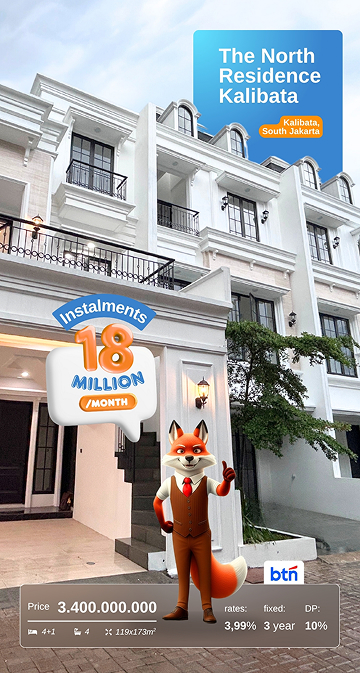When considering mortgage solutions to purchase a property, the fixed rate offers provided by banks are often a major attraction that influences your choice.
Fixed rates are typically offered by banks and other mortgage providers to make it easier to start paying for your home. However, the fixed rate scheme is temporary and will expire after a certain period.
So, what happens when your fixed rate period ends?
After the fixed rate period ends, your mortgage payments will switch to a floating rate. This floating rate follows the benchmark interest rate of Bank Indonesia (BI), so it can go up or down.
This will cause uncertainty in the amount of your regular monthly payments over time. To avoid this anxiety, one method you can consider is switching your mortgage from a floating rate to a fixed rate. This can be a smart financial decision. This method is then known as Take Over KPR.
As explained earlier, floating rates can cause uncertainty in monthly payments due to drastic increases in instalments. So, how will Take Over KPR help mitigate this risk?
1. Payment Consistency
Changing your mortgage back from a floating rate to a fixed rate provides certainty in your monthly payments.
2. Protecting Your Loan from Interest Rate Increases
In a market with a tendency for rising interest rates, fixed-rate mortgages provide protection against the spikes in payments that can occur with floating-rate mortgages.
3. Easier Financial Planning
With timely and consistent payments, your long-term financial planning will be more predictable and easier to do.
Steps to Transfer a Mortgage (Take-Over)
1. Finding the Best Offer
Research mortgage offers with fixed interest rates from various banks or financial institutions. Be sure to compare interest rates, administrative fees, and other terms and conditions. Consider factors such as:
- Interest rate (fixed or floating)
- Administrative fees
- Loan term
- Early repayment penalties
- Income and credit requirements
2. Apply for a New Mortgage
Once you find a suitable offer, apply for a new mortgage and make sure you understand the terms and conditions involved.
3. Officially Transfer the Mortgage
If you are approved for a new mortgage, carry out the official transfer process from the old mortgage to the new mortgage according to the established procedures.
6 Things to Consider Before You Transfer Your Mortgage
Check the Transfer Costs
Make sure you understand all the costs associated with transferring your mortgage, including administrative fees, notary fees, and other potential charges.
Ensure Financial Gain
Carefully calculate the financial benefits you will get from transferring your mortgage, including how much money you will save in the long run.
Moving your mortgage from a floating to a fixed interest rate can provide long-term financial stability. However, before making a decision, carefully consider and seek advice from a financial expert to ensure this step aligns with your financial needs and goals.
Moving a Mortgage (Home Ownership Credit) that already has a floating interest rate (linked to the fluctuating market interest rate) can be done in several steps:
Gather Extensive Information About New Mortgages
Find mortgage offers from other banks or financial institutions that offer more favourable interest rates and conditions than your existing mortgage. Be sure to consider administrative fees, interest rates offered, tenor, and other terms.
Compare Mortgage Offers
Carefully compare your existing mortgage with the new mortgage offer. Be sure to consider all costs associated with refinancing, including administration fees, notary fees, and any other fees that may arise.
Apply for a New Mortgage
If you find a more favourable offer, apply for a new mortgage according to the requirements set by the bank or financial institution you choose.
Pay Attention to the Transfer Process
Once you have obtained approval for the new mortgage, ensure you understand the process of transferring the mortgage from the old bank to the new one. This process may involve administrative procedures such as transferring property ownership documents and transferring mortgage instalment payments.
Ensure There Are No Hidden Costs
Before signing the agreement for a new mortgage, ensure you understand all the terms and conditions related to fees, interest rates, and other conditions. Make sure there are no hidden costs that could affect your total mortgage cost.
Pay Back the Old Mortgage (If Necessary)
If necessary, ensure that the old mortgage has been paid in full or arranged according to the bank's requirements to settle the old mortgage debt.
It is important to consult with a financial advisor or mortgage expert before making a decision to move your mortgage. They can help you understand the financial implications and terms and conditions associated with mortgage refinancing.














